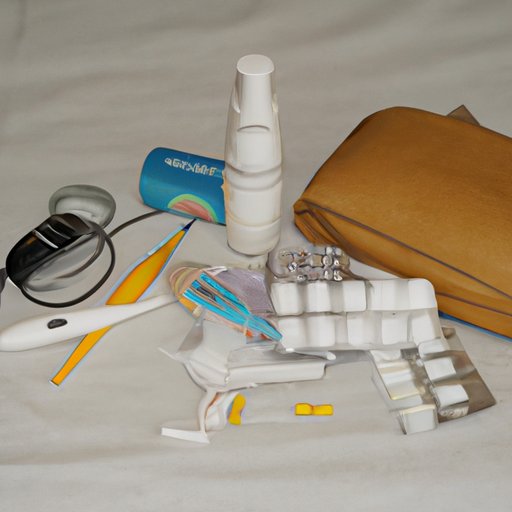Introduction
Traveling with medication can be a daunting task. Whether you’re taking prescription drugs or over-the-counter remedies, it’s important to know the rules and regulations of your destination country. In this article, we’ll discuss essential tips for traveling with medication safely and legally.

Research the Laws and Regulations of Your Destination Country
Before traveling with medication, it’s important to research the laws and regulations of your destination country. The U.S. Department of State advises travelers to “check with the foreign embassy of the countries you plan to visit to learn about their requirements for bringing medication into the country.” According to the U.S. Food and Drug Administration (FDA), some countries have restrictions on the types of medications that can be brought in. For example, some controlled substances may not be allowed in certain countries.
It’s also important to understand any other requirements for prescription medication. Some countries require prescriptions to be written in the language of the country, while others may require a medical certificate or doctor’s letter. It’s best to check with the foreign embassy of the country you’re visiting before traveling.
Prepare a Travel Medication Kit
Once you’ve researched the laws and regulations of your destination country, it’s time to prepare a travel medication kit. The American Society of Health-System Pharmacists recommends packing enough medication for your entire trip, plus an extra supply in case of delays or emergencies. Make sure to bring all necessary supplies and accessories, such as inhalers, syringes, needles, or Sharps containers.
It’s also important to label all medication. The FDA recommends labeling each item with a description of the medication, the prescribing physician’s name, and the dosage. This will make it easier to identify if any items are lost or stolen.
Pack Extra Medication
When traveling with medication, it’s important to pack extra medication. According to the American Academy of Family Physicians, travelers should bring at least two weeks of medication in case of delays or emergency situations. It’s also a good idea to bring copies of all prescriptions and a list of medications in case they need to be replaced.
Talk to Your Doctor
Before traveling, it’s a good idea to talk to your doctor. Discuss your trip plans and let them know what medications you’ll be taking. Your doctor may be able to provide additional advice or suggest any necessary changes. They may also be able to provide any necessary prescriptions or refills.

Keep Medication in Original Containers
When traveling by plane, it’s important to keep medication in its original container. The Transportation Security Administration (TSA) requires that all medication be placed in a clear plastic bag for screening. If you’re traveling with a large amount of medication, you may need to declare it to the TSA. Be sure to check the TSA website for more information and guidelines.

Check for Temperature Control Requirements
Some medications require special temperature control. According to the National Institute on Aging, some medications must be stored in a cool place or insulated bag. Other medications, such as insulin, may need to be refrigerated. If you’re traveling with temperature-sensitive medications, make sure to pack an insulated bag or cooler with ice packs.
Conclusion
Traveling with medication can be a challenge. To ensure a safe and successful trip, it’s important to research the laws and regulations of your destination country, prepare a travel medication kit, and talk to your doctor. Additionally, make sure to pack extra medication and keep all medication in its original container. Finally, be aware of any temperature control requirements for your medications. By following these tips, you can travel with medication safely and legally.
(Note: Is this article not meeting your expectations? Do you have knowledge or insights to share? Unlock new opportunities and expand your reach by joining our authors team. Click Registration to join us and share your expertise with our readers.)
